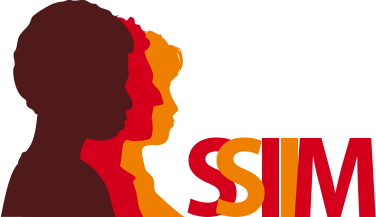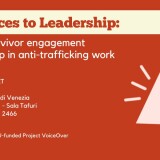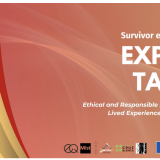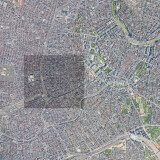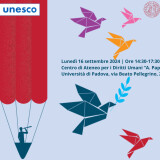NOW OPEN call for BIP – From place to city: constructing collectively the habitat
Here below some preliminary information and the draft programme. Call for application for the fellowships will open by the end of March 2024
DRAFT PROGRAMME
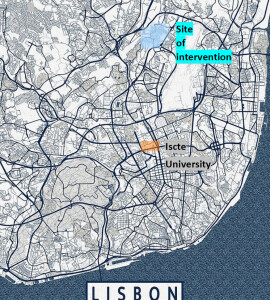 Blended Intensive Programmes (BIP) are a new funding scheme under the Erasmus+ Programme. BIP are international learning activities combining online seminars and a short physical mobility, designed around a “challenge-based” approach.
Blended Intensive Programmes (BIP) are a new funding scheme under the Erasmus+ Programme. BIP are international learning activities combining online seminars and a short physical mobility, designed around a “challenge-based” approach.
The BIP “From place to city: constructing collectively the habitat” is organized as a sequence consisting of pre-workshop, workshop and post-workshop activities. Pre-workshop activities will take place online (2 meetings, on the 4th and 18th of june 2024) and aim at building knowledge about the object of study, exposing participants to different theoretical and methodological approaches. The preparatory activities in the participating institutions will facilitate the establishment of a network of relationships amongs the students and topics, facilitating the work to be performed collectively later during the onsite workshop.
The work, initially developed at a distance, will be then brought together through the onsite one-week workshop (Lisbon, 8-12 July 2024), where teachers and learners will be involved in the development of urban strategies in multinational teams. The workshop will include lectures, collaborative thematic hands-on labs and study visits to neighborhoods. Both professors and students will interact with local stakeholders to learn about and discuss the specific urban challenges in each context.
After the onsite workshop, the learning process will be continued and consolidated back at each institution, supported by one more online collaboration (July 22nd, 2024).
Download here >> the detailed Agenda (draft, some details might be subject to minor changes/adjustements)
PARTNER UNIVERSITIES
- ISCTE – Instituto Universitario de Lisboa, Portugal (host institution)
- University Iuav of Venice, Italy
- FHWien der WKW, University of Applied Sciences for Management & Communication, Austria
- Gdansk University of Technology, Poland
- Politechnika Białostocka / Bialystok University of Technology, Poland
- Polytechnic University of Tirana, Albania
WHO CAN ATTEND
The BIP will involve up to 30 students from the partner universities, which are based in Italy, Portugal, Poland, Austria and Albania. Up to 7 Iuav students will be selected to participate to this workshop. All the activities will be carried out in English, hence fluent speaking and understanding skills are required, as well as basic writing skills (for the work to be delivered)!!!
For the University Iuav of Venice, eligible students are those enrolled in one of the following tracks:
- triennale in Urbanistica e pianificazione del territorio
- magistrale in Architettura and MA in Architecture
- Magistrale in Urbanistica e pianificazione del territorio (MS in Urban Planning for Transition + Urbanistica e Pianificazione per la Transizione)
CREDITS
For Iuav students the participation to the workshop will be recognized as intensive workshop and will be granted with 6 ECTS (CFU type D). In order to obtain these credits, participation to all the online and on-site working days is required, as well as the delivery of a final group work that will be explained and detailed along the process.
CONTENTS
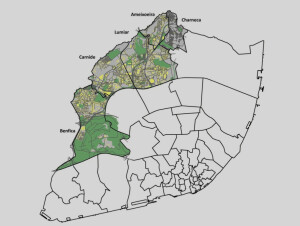 The BIP “From place to city: constructing collectively the habitat” (6ECTS) aims to engage students in collaborative design approaches in Lisbon’s neighborhoods characterized by diverse social, economic, and technological assets.
The BIP “From place to city: constructing collectively the habitat” (6ECTS) aims to engage students in collaborative design approaches in Lisbon’s neighborhoods characterized by diverse social, economic, and technological assets.
The Northern crown of the Municipality of Lisbon, specifically the Ameixoeira area, is characterized by territorial fragmentation and a general lack of socio-spatial cohesion. Although the Lisbon municipality has implemented various strategies for its redevelopment, many socio-urban critical issues are persisting such as illegal settlements, the island effect and ghettoization of some resettlement neighborhoods, urban decay in the historic core, and the proliferation of vacant urban spaces and undeveloped land. These challenges are difficult to overcome through conventional approaches.
It is therefore urgent to rethink fragmented territories, their dynamics, and transformations, in more human, democratic, resilient, and sustainable ways through the creation of spaces for transdisciplinary ideation and innovative and collaborative urban creative practices. Only in this way it’s possible to promote and foster thought and spatial intervention practices associated with active community participation in the development of public policies for the urban common.
This fragmented territory also lacks a strategy and territorial model that would add value and identity. Public space can play a significant role as a unifying force through its contribution to the physical and functional qualification of the cores and by facilitating better integration between communities and the services provided by elements of the ecosystem – soil, vegetation, fauna, water, sunlight, open space, food production, etc. – promoting pedestrian accessibility, improving functions and activities, creating centralities, fostering innovation, adding value, and contributing to the construction of a more sustainable sense of community.
In this regard, both academics and non-academics should contribute to refocusing the collective construction of the habitat on mediating strategies inherent in negotiation processes in the design of public space.
It is under this perspective that Iscte – Lisbon University Institute (host institution) , in association with the Lisbon City Council DMU/DPU/DRAUGI, Instituto Superior Técnico, and Faculty of Fine Arts of the University of Lisbon, are promoting an integrated and inclusive intervention in fragmented territories.
Starting Questions:
- What is the role of public space as a place of cohesion?
- How migration is changing cities?
- How can design build community?
- How to integrate fragmented territories?
Expected Learning Outcomes:
Collective construction of a vision, strategy, and solutions through a sustainable, transdisciplinary, and integrated approach for fragmented territories. Contribute to the development of an integrated and Inclusive Intervention Guide for fragmented territories through a Manifesto and Spatial Interventions. The Manifesto includes principles, values, visions, and strategies that guide possible solutions for spatial interventions.
Learning Approach
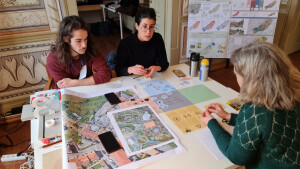 Students from all the participant universities will work together in groups covering the entire area. Each group will be assigned a specific zone. The working scale is flexible, chosen by each group, but all groups must address the four starting questions and the topics discussed.
Students from all the participant universities will work together in groups covering the entire area. Each group will be assigned a specific zone. The working scale is flexible, chosen by each group, but all groups must address the four starting questions and the topics discussed.
The aim is to train students with the necessary understanding and abilities to thrive in modern collaborative settings and adopt a transdisciplinary approach, adapting and responding thoughtfully and empathetically to the challenges, limitations, and possibilities presented by the design context and the interactions among individuals, materials, and technological processes.
The BIP activities are designed to further expose students to the theoretical framework, the tools, and methods needed: 1) to become adept in conceiving of, conceptualizing and communicating complex urban design challenges; 2) to develop theoretical, methodological, and practice- based approaches that will assist them in responding to such challenges through collaborative design practices initiating and developing a dialogue between all relevant stakeholders.
The aim is to involve all participants (academics, local community and students), as well as external stakeholders who play a role in the field of architecture, planning and urban development at the scale of the neighborhood, such as representatives of local authorities and civil society, in the co-creation of urban knowledge. Local partners, communities and relevant stakeholders will be reached through their direct involvement within the learning activities, thus reinforcing the societal roles of academic institutions, as well as activating knowledge through interaction with society.
FUNDING AND APPLICATION
Up to 7 scholarships of 553€ each will be available to Iuav students as contribution to travel and accommodation costs.
Official Iuav call (in italian) is now available at this link
APPLICATIONS ARE NOW OPEN!!! APPLICATION FORM IS AVAILABLE HERE. Deadline for application: 24th of April 2024, h. 12.00 (applications submitted after the deadline will not be taken into consideration)
The evaluation will take into consideration your weighted average mark, English language proficiency level and motivation letter.
The results will be published on this website and on Iuav dedicated page from 07/05/2024.
Please note that:
- scholarships will be granted only to those students who will attend ALL the 3+5 days of the BIP, and credits only upon delivery of the field work.
- scholarship will be paid upon conclusion of the BIP, when credits will be registered (i.e. students will have to book travel and accommodation themselves and advance all their expenses)
